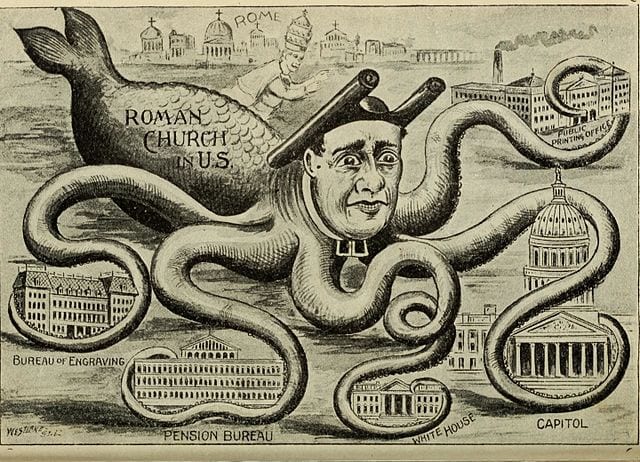Jason Engwer Sez Catholicism is Not Christian & Teaches a False Gospel

[Jason Engwer’s words will be in blue; those of Steve Hays in green; David T. King’s in purple]
I’ve written about this times without number: so many times that many of the former posts are not even on my blog anymore. I deleted them. But the hypocrisy continues. Recently I replied to one such anti-Catholic, Jason Engwer: with whom I have debated off and on since 2000, in my last posted article, St. Peter Listed First in Lists of Disciples: A Debate.
I gave notice to him about my reply on the site where he blogs, called Triablogue. But I am blocked there. I believe my comment was, thus, removed, though I’m not sure. I did let him know on his Facebook page. But then others commented on his blog as follows:
zipper778 10/13/2020 12:04 PM Have you done a reply to Dave Armstrong’s reply? I enjoy your writing Jason. I’ve learned a lot here on Triablogue.*Jesse 10/14/2020 12:39 AM Is Dave’s “rebuttal” really worth responding to? He will just take up all your time. I cannot even see what his link is.*zipper778 10/14/2020 8:06 AM It’s on Dave’s blog from a couple of days ago. He immediately labels Jason as an “Anti-Catholic Protestant polemicist”. It’s funny how Jason never describes himself in that way. Dave’s ad hominem attack right away makes the article uninteresting. So, I totally understand why Jason wouldn’t respond if he chose not to.
Timothy 10/14/2020 10:34 AM I read Dave’s rebuttal, it was not serious. He definitely has an ax to grind with the language he used.
First of all, it’s fascinating that Jesse in effect urges Jason not to respond, since he has issued at least two critiques of my work (one of them just 17 days ago) on his own website, Rational Christian Discernment:
A Rejoinder To Dave Armstrong On Sola Scriptura (3-17-19)
Dave Armstrong’s Utter Hypocrisy On Sola Scriptura And Private Interpretation (9-27-20)
But note that the reason given to urge Jason not to reply, is because I described him as an “Anti-Catholic Protestant polemicist”. This alone was immediately taken to be proof positive that my only intent was to engage in ad hominem attacks, have an “ax to grind” and am not “serious.” Of course, none of this is true. I think it’s just obfuscation and subterfuge, to avoid dealing with the argument in my article. Jesse replied further (probably after seeing this post):
I haven’t exactly “urged” Mr. Engwer to ignore Dave Armstrong as I simply wondered if debate would be fruitless. He can do whatever he wants. The irony lies in Armstrong misrepresenting me and my intention is to expose Roman Catholic claims.
As I have noted many times in the past, the term “anti-Catholic” is a legitimately scholarly one, with very specific meanings. It can have more than one meaning, but one of them is the one I habitually utilize: of a theological / doctrinal nature, meaning that it is a person who denies that Catholics, as a class of people who believe as Catholics do, are not to be classified as Christians. Here are my papers where I copiously document how scholars use the term:
Proper Theological Application of the Term “Anti-Catholic” (vs. Frank Turk) [9-24-05]
Theological / Doctrinal “Anti-Catholicism”: Scholarly Use [7-8-08]
“Anti-Catholic”: Scholars Use it Both as a Noun & Adjective [8-4-08]
Note that I also described Jason as a Protestant, which is something, as far as I know, that he would call himself, and is a non-controversial, accepted term. This means that I regard him as a Christians, since Protestants are validly baptized, trinitarian Christians, and regarded as such by the Catholic Church.
Granted, “polemicist” is a polemical term, and perhaps regarded as derogatory, but I deny that it is solely an “insult.” According to Merriam-Webster online, it merely means “an aggressive attack on or refutation of the opinions or principles of another.” Anti-Catholic critiques of Catholics are certainly that. Catholics are not the ones denying that Protestants are Christians. It is the small faction of anti-Catholic Protestants (including Jason) who irrationally and outrageously deny that we are.
Ironically, I ran across (truly by accident), a fan of Triablogue and of Jason’s, describing the work there as “polemical apologetics”:
Polemical Apologetics. It is an understatement to say that the Triablogue team has been prolific in its literary output. The purpose of this index is to make it easier to access and benefit from this abundance of material, especially those posts that are more substantive and timeless. Jason Engwer, Steve Hays and Patrick Chan have already done a good deal of work here, and so I draw on their efforts with much appreciation. (Afterall.net)
Steve Hays put up a post entitled, “Catholic polemics and the Enlightenment” (6-2-17). Blog regular John Bugay posted, “Defining “Divine Revelation” in Roman Catholic and Protestant Polemical Discussions” (2-17-14). There are many more casual references to “polemical” or “polemics” on the Triablogue site, as a search readily indicates. In fact, Steve Hays freely admitted:
I have a rather polemical style of writing much of the time, and a polemical style is bound to provoke a hostile reaction. I’m aware of that. I expect it. And I accept it. I know what I’m doing, and I know why I do it—with predicable results. I reap what I sow. (9-9-06)
All I’m saying is that fellow Triablogue (Protestant) blogger Jason Engwer is also a “polemicist” and (manifestly) an anti-Catholic as well.
Moreover, I have commended other work of Jason’s. For example, I wrote in a reply to him on 5-12-20:
Jason Engwer is a Protestant apologist who does a lot of good work of general apologetics in defense of Christianity (I have linked, for example, to a lot of his material concerning Christmas), alongside not-so-great anti-Catholic polemics. I rejoice in the former, and refute the latter on occasion, as I will do now.
I challenge anyone to find anything in Jason’s large volume of writings that is anywhere near as gracious or complimentary towards me as I was towards him. I’ll save you the trouble: it ain’t there.
Secondly, Jason has already replied to papers of mine of a very similar nature (about Petrine primacy), at least twice in the past. So to reply to this would simply be more of the same. I describe him as an anti-Catholic because he clearly is that: by the accepted scholarly definition.
Furthermore, let’s look at how Catholics are dealt with; how we are treated and described on Triablogue: the blog begun by the late Steve Hays (equally anti-Catholic, and one who has described me as having an “evil character”): a mentor to Jason, and currently dominated by Jason’s writings (as the ostensible successor to Steve). Steve Hays wrote in response to me in a post dated 6-10-05:
I suppose a Roman Catholic would object to “Romanist” or “Papist” on the same grounds as a Muslim to “Mohammedan.” Just as a Muslim will protest that he is a follower of Allah, not of Muhammad, a Roman Catholic will protest that he is a follower of Christ, not of the Pope—I guess. But isn’t the Pope the vicar of Christ?
In any case, I reserve the right to use designations which reflect my theological viewpoint, and not the outlook of my theological opponent.
A Romanist is someone who adheres to the primacy of Rome. A papist is someone who adheres to the primacy of the Pope. And so forth.
Since a Calvinist takes no offense at being denominated a Calvinist, I don’t see why a Catholic should take offense at being denominated a papist or Romanist.
Hence, I will continue to opine on the papistical popery of papistically papizing papists in the thrall of papistry and popedom.
Now, of course, Steve was free to establish that “Romanist” and “papist” were in habitual use by reputable scholars of all stripes, but for some strange reason he never did so, to my knowledge. And I’ll again save any reader of this the trouble to find it: there is no such legitimate use of these ridiculous words to describe Catholics. And even dictionaries note this. Hence, Merriam-Webster describes “Romanist” as an “often offensive” description of “Roman Catholics.” Likewise, it describes “papist” as “usually disparaging.” Dictionary.com also describes the two terms as “disparaging”.
On the other hand, both dictionaries do no such thing in their descriptions of the word anti-Catholic. Dictionary.com defines it (adjective) as “opposed to the beliefs, practices, and adherents of the Roman Catholic Church”, while Merriam-Webster states: “opposed to or hostile toward the Catholic church.”
Conclusion: I go by the standard usage of scholars (mostly historians and sociologists) and dictionaries. Steve Hays and many of his co-writers at Triablogue do not. If anyone is insulting and using ad hominem here, it’s them, not I. Steve Hays dug in on 6-11-05:
Words like “Romanist,” “popery,” and “papist,” as well as variations thereon, represent established historical English usage, with exactly the same etymological pedigree as other proper adjectives formed from proper nouns, including place names and proper names, according to whichever suffix linguistic convention assigns to the morphology of that particular word-group.
Lots of derogatory terms (such as the usual ones denoting various racial or ethnic groups) “represent established historical English usage.” At length society decided that they were disparaging and unacceptable, and not to be used anymore. The terms above for Catholics are among these. But Steve disagrees. He wanted to stake his claim as a uncharitable bigot till the end.
Jason himself uses “Catholic” (usually “Roman Catholic”) while many of his friends on the blog continue to use “Romanist”. David T. King, a notorious anti-Catholic, argued (over against Jason) not only that we should be called “Romanists” but even applied (irony or ironies) the term “anti-Catholic” to us:
With all due respect Jason, I do think you need to re-think your willingness to ascribe the term “catholic” to Romanists. The dogmas that are peculiar to that communion are not “catholic” either with respect to the consent of the rest of Christendom, and are actually “anti-catholic” in spirit to the rest of Christendom. To insist, for example, as Leo XIII did in Satis cognitum that papal primacy (even without reference to papal infallibility) is “the essential constitution of the Church” (§ 14) is as anti-catholic as the sentiment can be expressed.
I do not use the term “Romanist” as derogatory term, but rather as a description of those who adhere to the communion of Rome in order to distinguish them from the rest of Christendom, as they are so fond of doing . . . (9-25-10)
Jason replied:
The term shouldn’t be applied to them in a way that suggests their orthodoxy or the universal nature of all of their beliefs, and it shouldn’t be applied in a way that suggests that their denomination is the universal church or the heart of the universal church. They aren’t orthodox. And some of their beliefs aren’t universal even among all of the people they consider Christians. Some of their beliefs have little or no acceptance outside of their denomination. And they’re neither the universal church nor any sort of core or center of the universal church.
I use the term Catholic, with a capital C, as a commonly recognized title, much like I use the term Jehovah’s Witnesses without thinking that they’re actually witnesses of Jehovah. (9-25-10)
That’s not to say that Jason classifies Catholicism as theologically / doctrinally / creedally Christian. He’s simply being courteous by using accepted, standard terminology for a religious group that he disagrees with. He still refers to, for example, “a contradiction between the Biblical gospel and the Roman Catholic gospel” (8-7-10). See also:
[T]he Roman Catholic gospel is false and . . . should be considered to be under the anathema of Galatians 1 . . . (12-9-09)
[T]he possibility that some Catholic and Orthodox signers of the Manhattan Declaration are justified in spite of their group’s false gospel isn’t sufficient to justify the language of the document about those groups. Individuals who attempt to be justified in a manner contrary to what their group prescribes shouldn’t be considered representatives of their group’s view of salvation. (12-10-09)
Do you acknowledge that the document [Manhattan Declaration] is wrong about the Christian status of Catholicism and Orthodoxy? (12-10-09)
Catholics and Orthodox aren’t Christian from a Biblical perspective, not just from a conservative Protestant perspective. (12-10-09)
Evangelicals, Catholics, and the Orthodox do not share a common understanding of how the work of Christ accomplishes our salvation—and this is the heart of the gospel….Evangelicals came to our understanding of justification by faith alone the hard way, and we defend it as central and essential to Christianity itself. This is the doctrine of salvation, the kerygma, as preached by the true church. Without this doctrine, no church is a true gospel church. Many Evangelicals, myself included, remain unconvinced that any consensus on salvation now exists between those who hold to the teachings of the Reformers and those who hold to the official teachings of the Roman Catholic Church….Evangelicals must measure the claims of any church or individual by the simplicity of the gospel. If the true gospel is not preached, this is no true church. Again, any thoughtful Evangelical would acknowledge that there are certainly true Christians within the Roman Catholic and Orthodox churches, but that these true believers must in some sense come to the simplicity of faith through means other than the official teaching of these churches… (12-11-09)
He made a decision to return to Catholicism and has remained Catholic after being reminded of the false nature of the Catholic gospel many times and by many people. His decisions to revert to Catholicism and remain Catholic under such circumstances are evidence against his profession of Christian faith. And his unfaithfulness to the gospel is worse than Peter’s and the Galatians’ in some ways. (12-13-09)
This is all classic anti-Catholicism, as defined by scholars, not myself. And so my describing Jason as an “anti-Catholic” is not a personal insult: it is a straightforward application of established, documented (sociological-type) fact. Period.
And what was Jason’s decision?:
Thanks, zipper!
I have to be highly selective in what I do and don’t reply to, given how often I get responses from people, other work I’m involved with, and other factors. I’m not planning to respond to Dave’s article at this point.
What a huge shock! That makes it now ten posts that refuted Jason’s arguments, posted on my site between 5-12-20 and 10-14-20 (see them under his name on my Anti-Catholicism web page). Not a peep in reply.
And (as of 10-15-20), Jason has now blocked me on Facebook. One can’t be too careful!
***
Photo credit: “Romanism at Washington.” Paranoid anti-Catholic propaganda from the book Scott Funk Hershey, et al. Errors of the Roman Catholic Church: And Its Insidious Influence in the United States and Other Countries by the Most Profound Thinkers of the Present Day, and the History and Progress of the American Protective Association (A.P.A.). St. Louis: J.H. Chambers, 1894; photo plate between pp. x and xi. [public domain / Wikimedia Commons]
***













